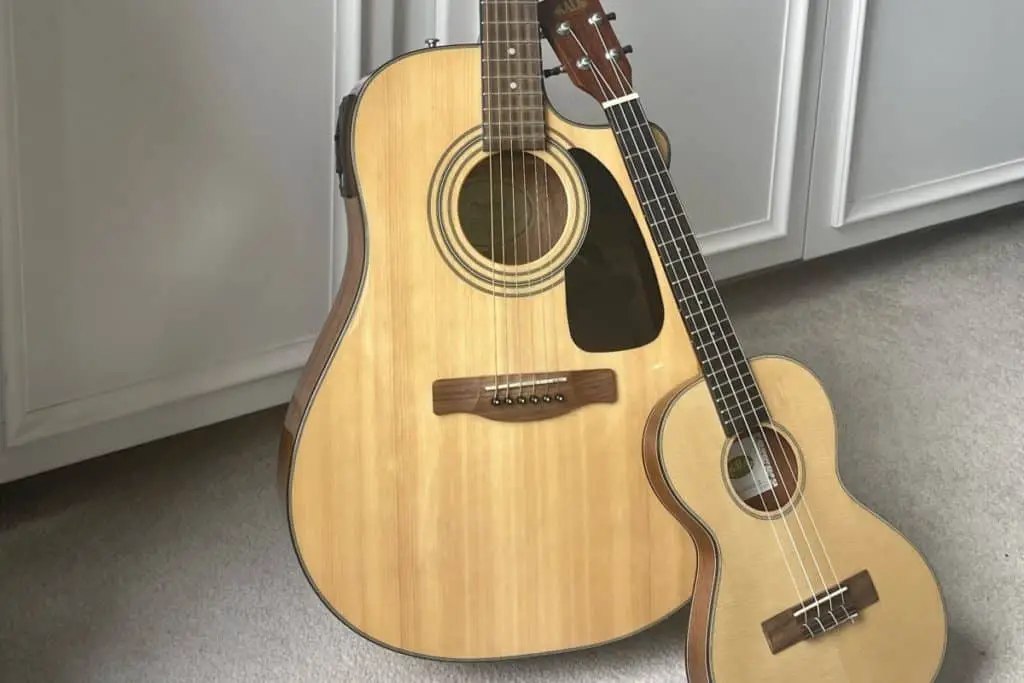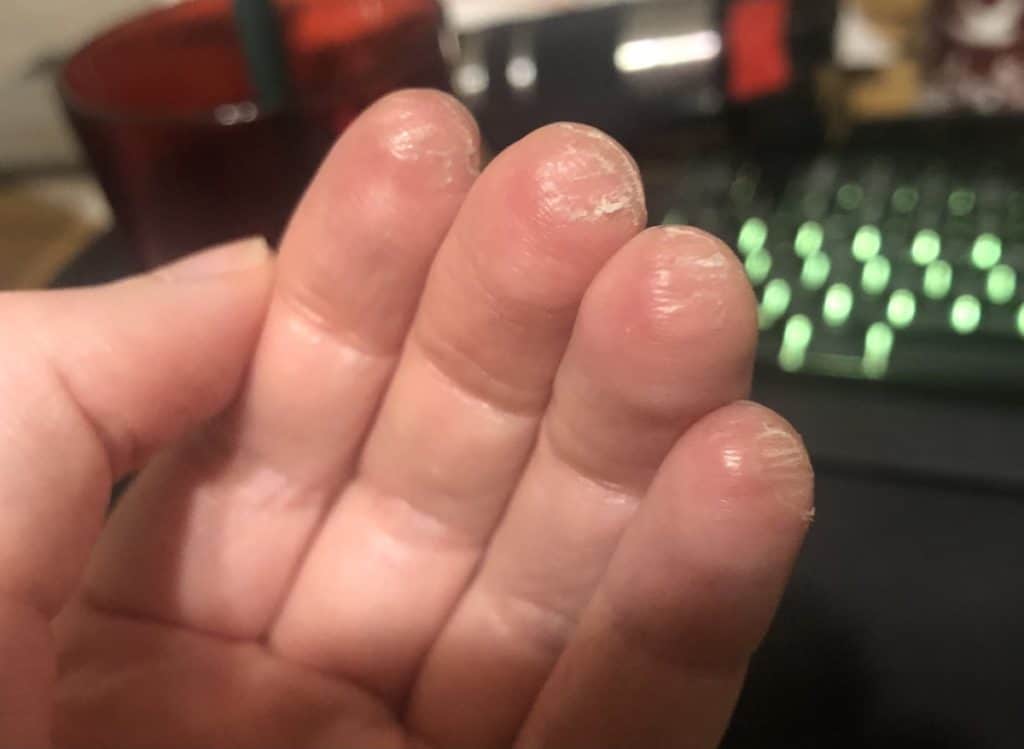Whether or not learning guitar is worth it for YOU, depends on what you want to get out of it, and how much time and effort you’re willing to invest into learning.
Learning guitar can have a number of benefits, including stress reduction, improved creativity, and an outlet to express yourself. However, it can also be difficult and time consuming to learn the guitar. But despite the challenges, over 16 million Americans have taken up guitar since 2020.
If you’re not sure whether you should learn guitar, try asking yourself these questions:
The “Compass Quiz” (Is Learning Guitar Worth It?)
1. What’s Your End Goal?
The first question to ponder is why learning guitar interests you. Do you want to try and learn some of your favorite songs just for your own enjoyment? Or do you want to make a living out of it, whether it’s earning extra cash at your local coffee shop or playing on stage in front of thousands of fans?
Any answer is great, but understand that playing at a level that people would actually pay for takes years to achieve. There’s no such thing as an “overnight success” when it comes to guitar (or any instrument for that matter).

If you just want to learn some songs and mess around in your free time, then by all means pick up a guitar: you’ll have a lot of fun! If you want to go pro, I’d still encourage you to try it out…just make sure you manage your expectations. Because if all you’re thinking about is making money and you don’t actually enjoy playing, what’s the point?
Even if you don’t aspire to be on stage, there’s nothing wrong with forming a garage band or just playing solo acts in your own living room!
2. Are There Other Instruments That Suit You Better?
When you listen to your favorite songs, what parts are you drawn to? Is it the sweet guitar riffs and solos? The beat of a bass drum? The melodic notes of a piano?
There are a lot more instruments out there than just the guitar. In fact, there are several instruments really similar to the guitar, including the ukulele which is actually easier to learn than guitar.

The point is, you should take some time to really figure out what sounds speak to you and what types of music you’d like to play most. Then you can determine which instrument may suit you best.
And if you’d like to learn more than one instrument, that’s cool too…maybe just learn one at a time.
3. How Much Time Can You Commit?
There’s no point in sugar coating it: learning to play guitar takes a lot of time.
Even if you just want to be a casual player and learn a few songs, it’s still going to take a considerable amount of practice to learn the basics. And this is before you can even start learning your first song.
How do you tune your guitar? How do you hold a pick correctly? How do you fret a note or chord without it sounding muted? How do you read music (even reading tablature can be a challenge at first)?
All of this takes time to build muscle memory before you even get to your first song. If you can dedicate a few hours a week for several weeks, you can probably get to a point where these things begin to feel less awkward.

Once you have a handle on basic techniques, it will likely take several hours of dedicated practice to learn your first beginner song.
What if you want to get to an elite level? Well this takes daily practice. If you can commit to playing for at least an hour every day, you’ll be amazed at how rapidly you can improve. But to shred like a pro, it will take more time than that…much more.
When you’re a beginner, there’s no need to push yourself too hard too quickly. If you’re practicing so much that you begin to hate playing because you’re not immediately getting better, it’s going to be hard to stay dedicated.
If you want to get really good, it’s about staying consistent, but also about knowing when to put the guitar down for a bit before you get frustrated.
4. Do You Have the Determination?
Speaking of frustration, learning to play guitar may sometimes drive you crazy, especially if you’re trying to learn a new song or technique.
If you’re someone who gets easily frustrated when you don’t get things right away, guitar may not be for you. Like with developing most skills, there will be a lot of failure before you see any success. This is a right of passage; the rent you have to pay to get better. If you’re not willing to pay the price, you can’t expect your skills to improve.

Playing guitar isn’t always fun. It takes more than just trying to play your favorite songs to be a good guitarist. There are a lot of techniques and skills that will level up your playing, but they aren’t always the most fun to learn or practice. It will take a lot of determination to practice the not so fun stuff, but it will make you a much better player.
This goes double for learning to read music. However, this isn’t always necessary depending on your end goal. Tab exists to make the lives of beginners easier…in fact, there are many famous guitarists who don’t know how to read music. So don’t let the daunting task of learning to read music stop you from learning to play!
Some studies show that 90% of new guitarists quit in the first three months. Don’t add to this statistic…focus on why you want to learn, manage your expectations, and take it one technique at a time.
5. Can You Endure Sore Fingers?
If you’ve never tried guitar before, you may be surprised to discover that playing can sometimes be physically painful. Those thin steel strings can make your fingertips hurt if you play a lot. This may not seem like a big deal, but see how it feels after spending hours sliding around the fretboard!
Now don’t get me wrong…the pain isn’t really that bad. But it can be annoying enough to distract you and make you lose focus when you’re trying to practice.

You may also find it difficult to get your fingers to move and bend like they need to in order to play notes and chords. This may cause some mild discomfort in your fret hand.
Fortunately, both of these situations tend to resolve themselves if you stick with it. Your fingertips will build calluses which minimizes the pain (and also gives you a more solid contact point with the strings, making the notes sound better), and your hand will hurt less as your fingers develop more flexibility.
This only happens if you push through it though. If you give up because it’s uncomfortable and then try playing again weeks or months later, you’ll have to start the strengthening process all over again. It’s just like working out: it’s a lot easier to maintain muscle than to build it.
Sidenote: don’t hurt yourself. If you decide to learn guitar, make sure you take breaks when you need to and don’t push yourself overly hard.
6. Can You Afford It?
Trying a new hobby can be expensive. Guitar is no exception.
Of course, “expensive” is a relative term: what may be a couple hours pay for one person may be a whole week’s salary for another. However, you don’t need to spend a fortune to get a great guitar (see this article for 18 great cheap guitar options).

But the cost doesn’t stop at the guitar. You’ll also need picks, replacement strings, and probably a strap. And if you choose an electric guitar, you’ll also need an amplifier and cable, which can be as much as (or more than) the guitar itself. For a decent quality guitar and amp, you’re looking at spending at least a few hundred dollars.
And then there are guitar lessons. There are in-person teachers, online coaches, or even self-study programs or apps (like Yousician). Some apps or online programs may be relatively inexpensive, but depending on your learning style you might get more out of in-person or online one-on-one coaching sessions…and these aren’t always cheap.
If you want to save money, you could forgo lessons entirely and try to learn on your own. It’s definitely been done before, and by some of the most famous guitarists on the planet (like Eric Clapton, Dave Grohl and Jimi Hendrix to name a few).
If you’re serious about learning guitar, I’d recommend taking at least a few lessons to learn the basic techniques to get you started. Then if you’re not sold on this learning style (or it’s too expensive), you can forge ahead on your own. You can learn anything on YouTube these days…I’m sure this applies to guitar as well!
5 Benefits of Learning Guitar
Now, I’ve given you some questions to answer as well as a heads-up on some common challenges. But, let’s be real, I LOVE the guitar. And I’m really glad I learned to play. Here are a few of the benefits that make learning the guitar worthwhile (in my opinion):
1. Improves Creativity
Musical ability is usually labeled as an artistic skill. Due to its self-expressive nature, playing guitar is a great way to foster creativity and help you think outside the box, which can positively impact other areas of your life as well.
2. Improves Fine Motor Skills
Some guitar techniques or songs will be really challenging at first. But the more you practice, the easier they become. Your fingers get used to moving and bending in certain ways, as if they begin to memorize where they need to be as you play through a song.
Guitar helps improve your fine motor skills through repetition. There’s even been some research supporting the use of guitar and other string instruments as rehabilitation for stroke victims.
3. Good for Your Mental Health
Playing guitar can help you relax and destress: something we all need from time to time. By tuning out everything else and just focusing on playing, we can get a break from any negative thoughts that tend to pop up. Learning guitar can be a great tool to fight depression and anxiety.
4. Sense of Accomplishment
Let’s not forget that learning a new skill feels good! It can be very satisfying to learn a new riff or make it through a song for the first time with no mistakes. Little victories like these can be a great confidence booster.
5. Impress your Friends
Let’s be honest, another reason you may want to learn the guitar is to impress your friends. Or perhaps, to impress someone you’re interested in romantically. Who hasn’t heard the stereotype of the dreamy guitarist?
3 Downsides of Learning Guitar
1. Initial Cost
So we’ve already touched on it above, but learning guitar isn’t free. There are obviously some costs associated with starting a new hobby (more if you choose electric guitar over acoustic). Though you can minimize these costs by choosing a budget-friendly guitar, if you’re not in a good financial position, it may be hard to justify spending the money.
2. Requires a Significant Time Commitment
It takes time and dedication to learn anything, but if you’ve already stretched yourself thin, you may not have the time needed to really progress your skills and get to the level you want to be at. If you do devote enough time to learning guitar, you may limit your time available to focus on other things you need to do or enjoy doing.
In the end, you need to decide how important learning guitar is to you and how much time you can really devote to practicing.
3. It Can be Frustrating
Just like any skill, at the beginning, you may get frustrated sometimes.
Things won’t always come easily. And you’ll need to have enough determination to make it through the hard days.
Conclusion: Should YOU Learn Guitar?
If you set realistic expectations, devote enough time to learning, and are dedicated enough to practice consistently without getting discouraged, there’s no reason not to learn guitar if it’s what you want to do.
There will always be costs associated with any new hobby or skill you want to learn, but if the benefits outweigh the costs for you, then head to your local music store and get on your way to becoming the next guitar legend!